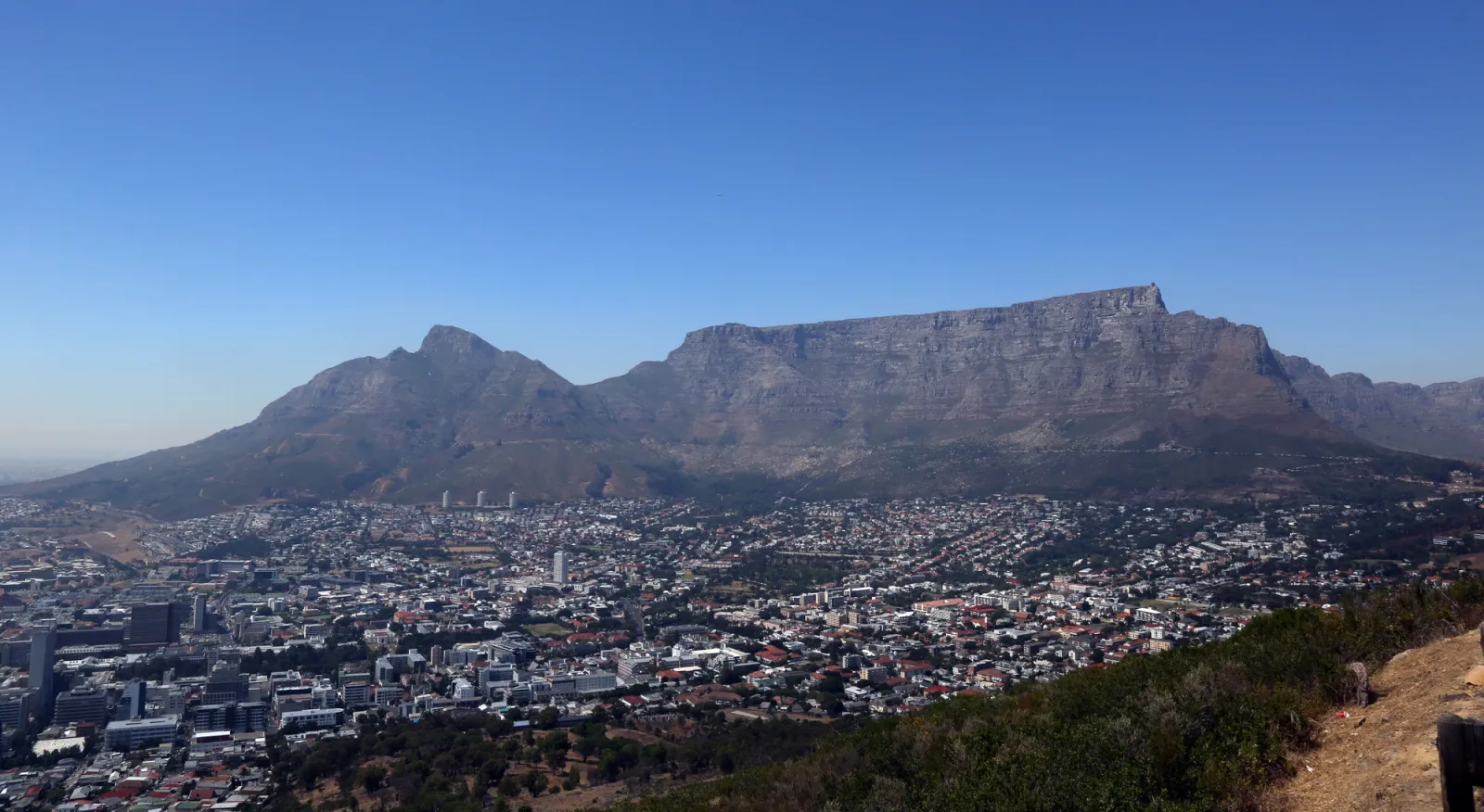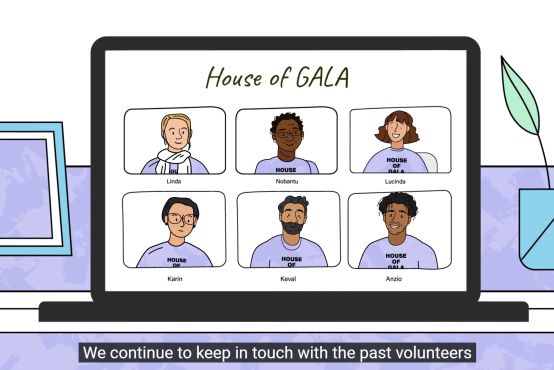
About South Africa
South Africa is located at the southern tip of the African continent and bordered by the coastlines of the Indian and Atlantic oceans. Beyond the coast, South Africa is a land of fertile valleys, massive mountains and deserts.
Colonisation has had a strong impact on South Africa. The country experienced colonisation by the Dutch and the British and was a British colony until 1961. The policy of apartheid was introduced in 1948. Since it ended in 1994, South Africa has undergone a democratic transition and become a prominent advocate for human rights on the African continent and beyond. This history has shaped the country today.
Poverty and inequality are key development challenges for South Africa. Despite rising GDP, South Africa’s income distribution pattern is among the most unequal in the world. Poverty is primarily experienced by the country’s black population.
South Africa faces other significant development challenges, particularly in the health sector. The nation has one of the world’s highest rates of HIV and AIDS and has a low average life expectancy compared to Australia.
South Africa is a constitutional democracy, and the transition to democracy was noted by the World Bank to be one of the most ‘remarkable political feats of the past century’. Since democracy, the African National Congress has held political power.
Economically, South Africa is often considered a ‘powerhouse’ of the African continent and has one of the three largest economies on the continent. South Africa’s diverse landscapes, nature reserves and flora and fauna bring tourists, and the nation is in the top three most visited countries in Africa.
Electricity supply shortages have constrained South Africa’s growth for several years. Rolling scheduled power cuts (load-shedding) started in 2007 and have intensified exponentially. This severe electricity shortfall has disrupted economic activity, water, connectivity and other basic services.
Australian volunteers have supported a wide range of South African partner organisations achieve their development goals since 1994.
Learn more about the Australian Volunteer Program's work in South Africa.
Key things to consider about volunteering in South Africa
- Cultural and Social Diversity. South Africa is a diverse and multicultural country with many languages, ethnicities, and traditions. It's important to be open to and respectful of this diversity while also being aware of potential cultural differences.
- The security context is very different from that which volunteers may be accustomed to in Australia. Vigilance, compliance with security guides, and active responses to security and safety advice must be adhered to.
- Rolling blackouts, also known as load shedding, have been a recurring fact in South Africa's energy supply infrastructure. Load shedding can significantly disrupt daily life, and can affect lighting, heating or cooling, cooking, and essential services. It also has economic impacts, affecting businesses and industries.
- Private healthcare in South Africa is excellent. It is accessible in the majority of the country.
Culture and religion
Living in South Africa varies across provinces, and rural versus urban contexts. People in rural contexts are more traditional and follow more conservative lifestyles with regards to dress, social customs and interactions between men and women. Cities have a more cosmopolitan feel, bringing together people from many countries and cultures across Africa to live and work.
South Africa has one of the most progressive constitutions in the world. However, the country continues to face many social justice challenges in people realising these rights. Volunteers may be exposed to harsh inequalities daily.
Religion
The South African constitution protects religious and faith-based freedom. Almost 80% of South Africans practice some form of Christianity. Other major religions present in South Africa are Hinduism, Islam and Judaism. There are also many who observe traditional cultural practices followed through many centuries of tribal and traditional beliefs, that may combine Christianity and traditional cultural beliefs. Some traditional belief systems are patriarchal and can be challenging to volunteers.
Dress
Dress is usually quite casual but can vary depending on the occasion and at special events. Volunteers should bring a range of clothing with them to also accommodate weather variations.
Language
South Africa has a diverse linguistic history. There are 12 official languages, the most recent addition is South African Sign Language. isiZulu is the most spoken language and is the primary language of over 12 million people. English is widely spoken and is the preferred language of business. Learning a local language for the context a volunteer is placed in will enhance their acceptance within their community, and their volunteer experience.
The program provides funding to support language lessons. More information on this process will be available during the onboarding process.
Explore our Pride Guides
LGBTQIA+ program participants must be aware of the country's context before undertaking an assignment. Pride Guides are designed to introduce key issues related to people with diverse SOGISEC & their participation in the program.
Learn more
Day to day life
Climate
South Africa is a large country with various climate zones. These range from tropical areas on the KwaZulu-Natal province coast to snow in the Drakensberg mountains, and more temperate climates in the Highveld areas like Johannesburg. Average temperatures range from 3°C to 26°C in Johannesburg, 7°C to 26°C in Cape Town, and 23°C to 28°C in Durban. In some areas temperatures go below zero in winter.
It is important to note the effects of climate change on day-to-day life and weather patterns in South Africa, this will look different based on location. According to the World Bank, South Africa will see an escalated risk of heat waves and drought in the coming years.
Telecommunications
Telecommunications access in South Africa is similar to Australia. In more rural areas connectivity is slower and less reliable. During electricity load-shedding periods connectivity can be poor.
Food and dining
Chain supermarkets are widely available, catering for various tastes and budgets. Some cities have organic food markets and many shopping malls have health food stores for specific dietary requirements. There is a growing awareness of vegan and vegetarian needs in supermarkets and restaurants.
Alcohol is available in bars, restaurants, hotels and shops licensed to sell alcohol.
Accommodation
Accommodation options vary from house shares to apartments or small suburban houses. Availability may differ from rural to urban contexts with differences in cost and variety. Rural areas may have less variety and more basic amenities. Security needs are important when considering accommodation and the level of security systems in place may vary.
Find out about our in-country allowances.
Transport
Most cities have various public transport options, including buses, public minibus taxis and trains. In Johannesburg there is an intercity speed train service called the Gautrain as well as bus services. People also make extensive use of ride-sharing apps. Transport in regional and rural locations can be more challenging. Should volunteers choose to purchase a vehicle, second-hand cars are available.
Partner spotlight
Find out how Australian volunteer Luci has supported the critical work of the organisation remotely from Australia.

Personal Safety
The security context is very different from that which volunteers may be accustomed to in Australia. Vigilance, compliance with security guides, and active responses to security and safety advice must be adhered to. Security presents a range of challenges and needs very careful consideration when selecting places to live, where to walk and how to travel.
Personal safety issues constantly evolve, we recommend you keep an eye on Smart Traveller for current information.
Mobility and accessibility
We’re committed to ensuring that international volunteering is inclusive and accessible to Australians from a range of backgrounds, with diverse perspectives, identities and abilities.
To support this, Access and Inclusion Plans are available for volunteers with disabilities to assess their needs and ensure their living and working requirements are fully considered. Indigenous Pathways is an Indigenous-led program that focuses on providing culturally safe, flexible and tailored support for Aboriginal and Torres Strait Islander volunteers.
Physical access for wheelchairs and other mobility aids is well supported in South Africa. There is a growing number of accommodation options and facilities which provide access for the disabled and elderly.
Before applying for a volunteering assignment in South Africa, please do some further research on living in South Africa and the organisation you are hoping to volunteer with. Successful applicants will have the opportunity to discuss expected living and working arrangements with their recruitment officer.